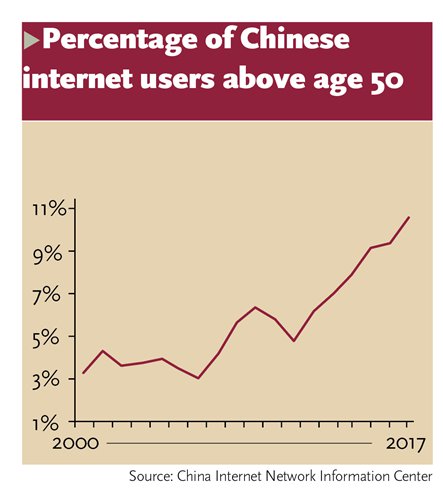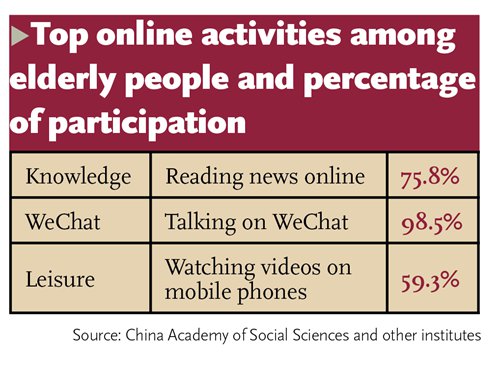Growing number of elderly web users are reshaping China’s online economy
Silver internet

Photo: VCG

Percentage of Chinese internet users above age 50

Proportion of surveyed people above 50 years old with social apps

Top online activities among elderly people and percentage of participation
Chen Huijuan, a 60-year-old retired worker in Yancheng in East China's Jiangsu Province, is finding that episodes of the latest TV shows and rounds of poker games with friends no longer hold her interest.
Her smartphone is what has her attention these days.
The first thing Chen does after waking up at 6:30 am is open the Ximalaya FM app so she can listen to an audiobook before she starts to cook breakfast and do household chores. In the afternoon, Chen takes a look at what's new on online shopping apps such as Taobao, Pinduoduo, or JD.com, where she buys everything from clothes and furniture to everyday necessities.
After dinner, Chen often makes video calls to her daughter and grandson on WeChat, or sends some red envelopes to them through WeChat during festivals. Before sleep, Chen checks her friends' latest posts on WeChat and watches short videos on Tik Tok, also known as Douyin.
Sometimes, Chen plays a round of online poker through an app called QQ Chinese poker. And if she happens to have "irresistible good luck," she might play until midnight.
"My life would definitely be boring and lonely if not for the smartphone and wifi. I have to kill almost eight hours on my own every day," Chen told the Global Times on Monday.
Chen's only child is now working in Shenzhen in South China's Guangdong Province and only comes back home during Spring Festival holidays every year. Her husband is quite busy at work.
"I spend at least four hours on my phone every day," Chen said.
Chen is not the only one her age with "internet addiction." Middle-aged and elderly people, who have more free time than younger generations, are spending more time on the internet each day, especially as mobile phones become more widespread.
A Beijing-based white-collar worker surnamed Tu told the Global Times on Monday that she even bought reading glasses for her parents - both over 60 years old - so they can more easily enjoy their mobile phones.
"TV programs are just the 'background music' for them when playing on their phones," Tu said.
According to a report on China's internet trends from 2019 to 2020 sent by Tencent to the Global Times, among middle-aged and elderly internet users (over 40 years old), 65.7 percent spend at least a quarter of their free time on mobile phones every day, and nearly 30 percent of them are heavy users who spend more than half of their free time on their phones.
Spending online
Elderly internet users are expected to bring the biggest growth dividends online in the future, while dividends from core internet users - those between 18 to 40 years old in the first- and second- tier cities - are decreasing, the Tencent report said.
Meanwhile, the number of elderly internet users is also increasing at a faster-than-expected speed. As of June 2018, middle-aged and elderly internet users in China had surpassed 200 million, including more than 40 million internet users over the age of 60, according to data released by China Internet Network Information Center.
Data released by WeChat showed that more than 630 million users over the age of 55 were active on WeChat every month in 2018.
"We found that some mini games or programs on WeChat, developed by third parties, are particularly popular among elderly users," WeChat said in a note it sent to the Global Times on Monday.
While their soaring number alone is impressive, the spending power of elderly internet users cannot be ignored either.
"I spent around 20,000 yuan ($2,957.75) to register a VIP account for my son on the [matchmaking platform] zhenai.com app in January this year. Although it's not a small amount, if he ends up finding a good wife, then that will definitely be worth it," Zhang Hui, a 60-something woman who lives in Shanghai, told the Global Times on Monday.
The 20,000-yuan VIP service allows her son to have offline face-to-face dating opportunities, and can ensure "higher quality dates" than the 400-yuan service, according to Zhang. Zhang said she buys almost everything on Taobao and JD.com these days, since online shopping is convenient and cheaper than offline stores.
Chen, the retiree from Jiangsu Province, said that she sometimes rewards the author via her audiobook app when she finds a book interesting and well-written. She has spent more than 500 yuan on rewards on Ximalaya FM so far. Another 70-year-old resident in Nanjing in East China's Jiangsu Province told the Global Times that he had spent more than 1,000 yuan on a mahjong app in the past year.
According to a report jointly released by Chinese Academy of Social Sciences and other institutes, it is estimated that by 2030, consumption by elderly people will reach 18 trillion yuan.
"Compared with busy young people, older people have more time, and even more savings. With China's rapid aging population, the group will only grow stronger, which internet companies and app developers should pay more attention to," Long Tianhong, a Beijing-based internet financial analyst, told the Global Times on Tuesday.
New battlefield
Some industry players have already kicked off the race to grab a share of the future market.
Last year, Alibaba released a recruitment message seeking product experience staff over 60 years old, a position that comes with an annual salary of 400,000 yuan, in a bid to gain a good command over how elderly users view the Taobao platform, according to media reports.
An app called Tangdou was launched to cater to elderly and middle-aged women who like to dance in public squares during their spare time. It was rated as the most downloaded mobile app in the "exercise and health" category. Tangdou's mini programs on WeChat have also gained great popularity, ranking among the top 10 favorites among all programs, according to a post on the company's official website.
Tangdou received around $5 million in its latest round of financing in 2017. So far, it has received funding totaling $30 million, according to the post.
However, Long cautioned that despite signs that seniors are showing a growing addiction to the internet, they are more interested in saving money, and making money online, rather than spending online.
"Also, they tend to spend in a conservative way when spending online and are more likely to engage in low-risk investment activities - which might also mean lower profits for those product developers," Long said.
A report from domestic news site 36kr.com showed that in the first half of 2018, wealth management apps were the most popular category among the elderly in terms of downloads, followed by shopping apps and apps in which users can make money by sharing articles.
Several interviewees the Global Times talked to said that they tend to ask their children to pay for them when shopping online, rather than linking a bank card themselves. They are afraid of being scammed.
This phenomenon spurred Alibaba to launch a "family account" service on Taobao in January 2018 to make it more convenient for younger people to pay for products online for their elderly family members.
"How to balance the demands of these elderly groups, while at the same time exploring a way to make profits, might become the main topic for market players at some point," Long said.
"Internet developers should also pay attention to the special demands of the elderly, who prefer bigger fonts and simplicity," Long said.

